- COTTICE (COTISE or COST)
- See ‘appendix VII’ (also
‘cotticed 1)’ below).
![[example]](../images/v/vxt-d1164a.gif)
- COTTICED (COTISED or COTIZED)
- 1) On flags, a term that may be used to describe the addition of one or more
narrow stripes or bands to an existing charge (such as a stripe or cross) but
which is separated from that charge by a strip of field - but see note below.
- 2) In heraldry the term has a rather more restricted/complex use which is
briefly described in Appendix VII, however, it is
suggested that a suitable glossary or dictionary of heraldry should be
consulted for further details.
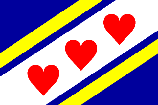
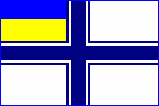
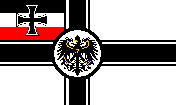
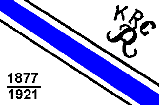
Flag of Bělá u Jevíčka, Czech Republic (fotw);
Naval Ensign of Ukraine (fotw); Imperial War Flag 1903 – 1919, Germany (fotw); Flag of Koblenzer Rowing club, Germany (fotw)
Please note with regard to 1) that where the field is not shown between the charge
and the cottice (as illustrated below) it should be described as double or triple fimbriated as appropriate
(see also ‘fimbriation 1)’).
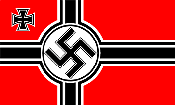
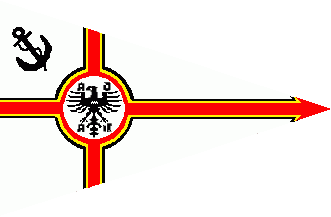
War Ensign of Germany 1938 – 1945 (fotw); Pennant of the
Allgemeiner Deutscher Automobilclub, Germany (fotw)
- COUCHANT
- See ‘Appendix V’.

Arms of Tristach,
Austria (ICH)
- COUNTER-
- The heraldic prefix used when two charges on a shield, banner of arms or flag are turned in contrary directions
as in “fleuri-counterfleuri” (see ‘double-tressure’), or when two
tinctures are reversed either side of a line or lines drawn through a coat of arms see
‘counterchanged’ (also
‘counterchanged cross’ in ‘appendix VIII’ and
‘counter-compony’).
- COUNTER-COMPONY
- An abbreviation of the heraldic term compony counter-compony used when an
ordinary or border is composed of two rows of squares (or occasionally
rectangles) in alternating tinctures – see ‘counter-’ above and
‘compony’
(also ‘checky 1)’,
‘checky 2)’,
‘counterchanged’ below,
‘ordinary’ and
‘tincture’).
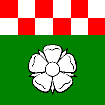
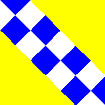
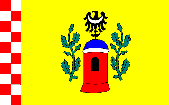
Flag of Olsberg, Switzerland (fotw): Flag of Niemcza, Poland (Jarig
Bakker): Flag of Calfreisen, Switzerland (fotw)
- COUNTERCHANGED (or COUNTER-CHANGED)
- (adj) A basically heraldic term used to describe two colours alternating either
side of a line or lines drawn through a flag or coat of arms or charge - parti-coloured
(see also ‘charge’,
‘coat of arms 2)’
‘counter-’,
’counterchanged cross’ in ‘appendix VIII’,
‘counter-compony’ above
and ‘faceted’).
![[counterchanged]](../images/v/vxt-d101.gif)
![[Greenland]](../images/v/vxt-d101a.gif)
![[Tas-Sliema, Malta]](../images/v/vxt-d1963.gif)
![[Supetar, Croatia]](../images/v/vxt-d2178a.gif)
![[Supetar, Croatia]](../images/v/vxt-d2178.gif)
![[Maryland, US]](../images/v/vxt-d101b.gif)
From left: counterchanged example; Flag of Greenland (CS); Flag of
Tas-Sliema, Malta (fotw); Arms and Flag of
Supetar, Croatia (Željko Heimer); Flag of
Maryland, USA (CS)
- COUNTERCHANGED CROSS
- See ‘cross counterchanged’ in
‘Appendix VIII’.
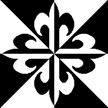
Putative Banner of the Dominicans (fotw)
- COUNTY ARMS (or COAT OF ARMS)
- See ‘civic arms 2)’.
![[Gloucestershire county arms]](../images/v/vxt-d304.gif)
Arms of the County of Gloucestershire, UK (ICH)
- COUNTY FLAG
- See ‘sub-national flag’ (also
‘civic flag 2)’.
![[Gloucestershire county flag]](../images/v/vxt-d306.gif)
Flag of the County of Gloucestershire, UK (fotw)
- COUPEAU (or COUPEAUX)
- A French heraldic term for the base of a shield, banner of arms or a flag that is composed of
semi-circular mounds, and is intended to represent (usually) three (but up to six) hills –
a coupeau of three, four, five or six, mount of coupeau or threemount -
see ‘compartment’ (also ‘mount’).

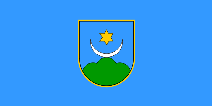

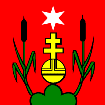
Arms and Flag of Ludbreg, Croatia (fotw); Arms of Pope Paul VI (Modern Popes); Flag of Oberohrdorf, Switzerland (fotw)
- COUPEAU (or COUPEAUX) OF THREE (or COUPEAU/COUPEAUX OF FOUR, FIVE
or SIX)
- See ‘coupeau’ above.
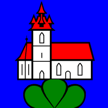
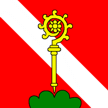
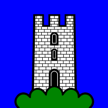
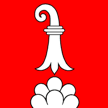
Flag of Kirchberg, Switzerland (fotw); Flag of
Villarbeney, Switzerland (fotw); Flag of Obstalden, Switzerland (fotw); Flag of Delémont, Switzerland (fotw)
- COUPED
- 1) The heraldic term used when a charge is cut off in a straight line as is often the case with the heads and
limbs of animals but see 2) below (also 'erased').
- 2) A heraldic term that is also used when an ordinary or charge does not extend to
the edges of a shield or banner of arms, for example a cross-couped – but see
‘slipped’ (also
‘charge’,
‘cross-couped’ in ‘appendix VIII’,
‘Greek cross’ and
‘ordinary’).
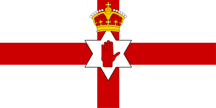
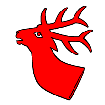
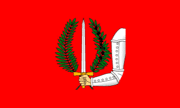
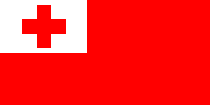
Unofficial Flag of Northern Ireland (fotw); Flag of
Andwil, Switzerland (fotw); Flag of
Il Birgu, Malta (fotw);
National Flag of Tonga (fotw)
- COURTESY FLAG
- That flag (normally, but not exclusively, the national flag of the country
being visited) flown from a prominent position on a merchant vessel as a matter
of courtesy when visiting a foreign port – a complimentary flag (see also
‘yardarm’).
- COVERING
- In vexillology the term used when a canton charge or emblem obscures the entire width of a stripe or stripes on a multi-striped flag,
and in the case of a canton usually (but not invariably) at the hoist – for example, a square or rectangular canton covering the first
three stripes or a charge off-set towards the hoist and covering the centre
five stripes as shown below - encroaching upon (see also
‘canton 2)’,
‘multi-stripe’ and
‘overall 1)’ and
‘partially covering’).
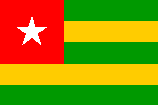
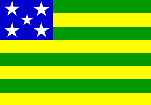
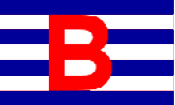
National Flag of Togo (fotw); Flag of
Goiás, Brazil (fotw); Flag of
The Bohus Line, Sweden (Eugene Ipavec)
Please note that this term is never used alone but always with the number of
stripes being covered.
- COWARD
- See ‘appendix V’.
![[coward]](../images/v/vxt-d1109.gif)
![[coward]](../images/v/vxt-d1109a.gif)
Flag and Arms of Paršovice, Czech Republic (fotw)
- COWED
- See ‘queued’.
![[cowed]](../images/v/vxt-d2859.gif)
![[cowed]](../images/v/vxt-d2859a.gif)
Flag and Arms of Schleiden, Germany (fotw & ICH)










![[counterchanged]](../images/v/vxt-d101.gif)
![[Greenland]](../images/v/vxt-d101a.gif)
![[Tas-Sliema, Malta]](../images/v/vxt-d1963.gif)
![[Supetar, Croatia]](../images/v/vxt-d2178a.gif)
![[Supetar, Croatia]](../images/v/vxt-d2178.gif)
![[Maryland, US]](../images/v/vxt-d101b.gif)

![[Gloucestershire county arms]](../images/v/vxt-d304.gif)
![[Gloucestershire county flag]](../images/v/vxt-d306.gif)















![[coward]](../images/v/vxt-d1109.gif)
![[coward]](../images/v/vxt-d1109a.gif)
![[cowed]](../images/v/vxt-d2859.gif)
![[cowed]](../images/v/vxt-d2859a.gif)

![[example]](../images/v/vxt-d1164a.gif)